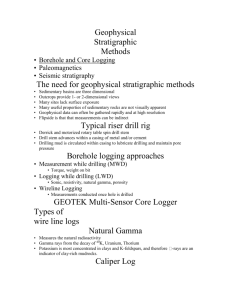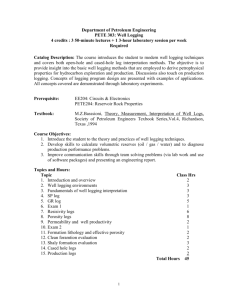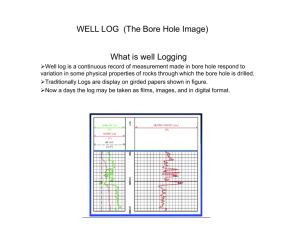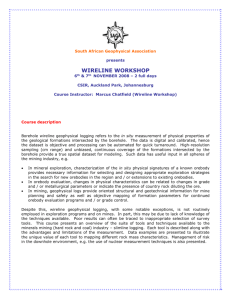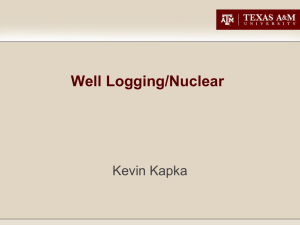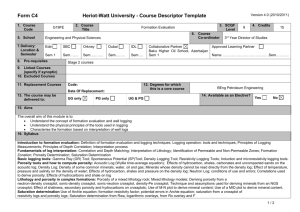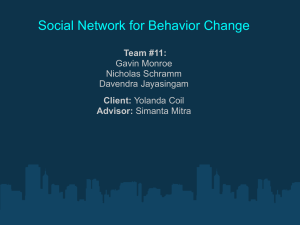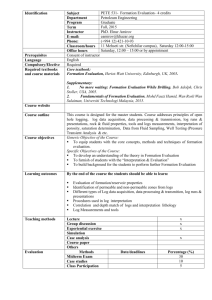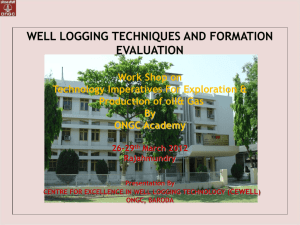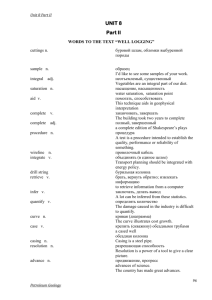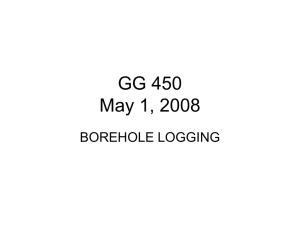Identification
advertisement
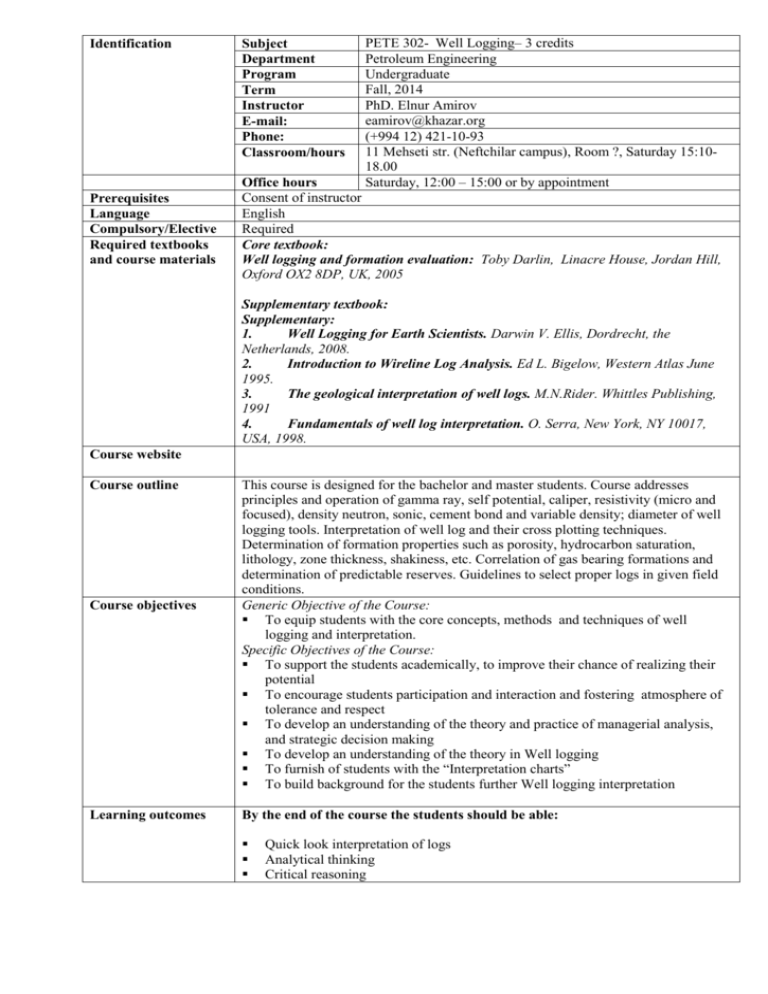
Identification Prerequisites Language Compulsory/Elective Required textbooks and course materials Subject Department Program Term Instructor E-mail: Phone: Classroom/hours PETE 302- Well Logging– 3 credits Petroleum Engineering Undergraduate Fall, 2014 PhD. Elnur Amirov eamirov@khazar.org (+994 12) 421-10-93 11 Mehseti str. (Neftchilar campus), Room ?, Saturday 15:1018.00 Saturday, 12:00 – 15:00 or by appointment Office hours Consent of instructor English Required Core textbook: Well logging and formation evaluation: Toby Darlin, Linacre House, Jordan Hill, Oxford OX2 8DP, UK, 2005 Supplementary textbook: Supplementary: 1. Well Logging for Earth Scientists. Darwin V. Ellis, Dordrecht, the Netherlands, 2008. 2. Introduction to Wireline Log Analysis. Ed L. Bigelow, Western Atlas June 1995. 3. The geological interpretation of well logs. M.N.Rider. Whittles Publishing, 1991 4. Fundamentals of well log interpretation. O. Serra, New York, NY 10017, USA, 1998. Course website Course outline Course objectives Learning outcomes This course is designed for the bachelor and master students. Course addresses principles and operation of gamma ray, self potential, caliper, resistivity (micro and focused), density neutron, sonic, cement bond and variable density; diameter of well logging tools. Interpretation of well log and their cross plotting techniques. Determination of formation properties such as porosity, hydrocarbon saturation, lithology, zone thickness, shakiness, etc. Correlation of gas bearing formations and determination of predictable reserves. Guidelines to select proper logs in given field conditions. Generic Objective of the Course: To equip students with the core concepts, methods and techniques of well logging and interpretation. Specific Objectives of the Course: To support the students academically, to improve their chance of realizing their potential To encourage students participation and interaction and fostering atmosphere of tolerance and respect To develop an understanding of the theory and practice of managerial analysis, and strategic decision making To develop an understanding of the theory in Well logging To furnish of students with the “Interpretation charts” To build background for the students further Well logging interpretation By the end of the course the students should be able: Quick look interpretation of logs Analytical thinking Critical reasoning Teaching methods Evaluation Policy Team building Leadership Presentation Other… Lecture Group discussion Experiential exercise Simulation Case analysis Course paper Others Methods Midterm Exam Case studies Class Participation Assignment and quizzes Project Presentation/Group Discussion Final Exam Others Total Preparation for class x x x x Date/deadlines Percentage (%) 30 10 20 40 100 The structure of this course makes your individual study and preparation outside the class extremely important. The lecture material will focus on the major points introduced in the text. Reading the assigned chapters and having some familiarity with them before class will greatly assist your understanding of the lecture. After the lecture, you should study your notes and work relevant problems and cases from the end of the chapter and sample exam questions. Throughout the semester we will also have an assignment and quizzes. Withdrawal (pass/fail) This course strictly follows grading policy of the School of Engineering and Applied Science. Thus, a student is normally expected to achieve a mark of at least 60% to pass. In case of failure, he/she will be required to repeat the course the following term or year. Cheating/plagiarism Cheating or other plagiarism during the Quizzes, Mid-term and Final Examinations will lead to paper cancellation. In this case, the student will automatically get zero (0), without any considerations. Professional behavior guidelines We ek The students shall behave in the way to create favorable academic and professional environment during the class hours. Unauthorized discussions and unethical behavior are strictly prohibited. Date/Day (tentative) 1 20.09.14 Tentative Schedule Topics Introduction to Well logging Textbook/Assignments Ch.1 2 27.09.14 3 04.10.14 4 11.10.14 5 18.10.14 6 25.10.14 7 01.11.14 8 08.11.14 9 10 15.11.14 22.11.14 11 12 13 29.11.14 06.12.14 13.12.14 14 20.12.14 15 27.12.11 TBA History and terminology Logging tools (general overview) Passive measurements (SP) Quicklook log interpretation Full interpretation Gamma ray tools (natural and spectral gamma rays measurements) Interpret lithology QUIZ 1 Knowledge sharing session (log quality control) Acoustic tools (propagation of sound and sonic logs) Determination of porosity from sonic logs Density tools (bulk density interpretations) Neutron scattering and neutron logging tools Resistivity tools Wireline vs LWD tools Resistivity theory/Saturation (Archie equations) QUIZ 2 Determination of porosity from density &neutron logs Core and log interpretation Well log correlation/zonation Shaly sand evaluation A Shaly sand evaluation B Net sand/pay, resources, reserves calculation using well logs data Dipmeter surveys Dip computation Dip patterns and interpretation overview Final Exam Ch.2 Ch.3 Ch.4 Ch.5 Ch.6 Ch.7 Ch.8 Ch.9 Ch.10 Ch.11 Ch. 12 Ch. 13 Ch.14 This syllabus is a guide for the course and any modifications to it will be announced in advance.
